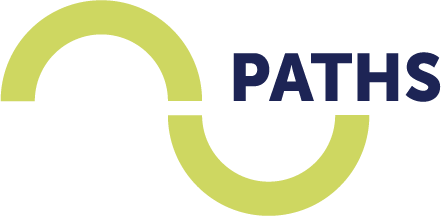PATHS (Pediatric Access to Telemental Health Services)
 |
What is PATHS?
PATHS (Pediatric Access to Telemental Health Services) is a program dedicated to increasing capacity for primary care providers in all Alabama communities to diagnose, treat and manage mild to moderate behavioral health conditions in children and adolescents. It is designed to help primary care providers in these communities be better equipped to address pediatric mental health concerns.
PATHS provides:
- Behavioral health case consultation for primary care providers.
- Educational programs in the treatment of a variety of behavioral health disorders in children and adolescents.
- Care coordination for those patients with complex conditions or comorbid disorders.
- Referrals to behavioral health resources in the patient’s community where available.
- Behavioral health services via telemedicine between a patient in the primary care office and a PATHS behavioral health professional at Children’s of Alabama, when specialist intervention is needed.
What are the benefits for primary care providers who enroll with PATHS?
PATHS brings behavioral health case consultation and treatment services to primary care practices who are enrolled in the program – via telemental health services – provided by a Children’s team of licensed behavioral health professionals and an infant/early childhood mental health consultant. The PATHS team consists of child/adolescent psychiatrists, psychiatric nurse practitioners, child/adolescent psychologists, licensed clinical social workers, licensed professional counselors, registered dieticians, and infant and early childhood mental health consultants. Our mental health team provides the following services:
- Case consultation by phone between the primary care team member and our mental health team.
- Behavioral health education and consultation, utilizing the Project ECHO model, a guided practice model of telementoring that brings specialty knowledge to primary care practices. Typically, one hour of Category 1 CME credit is awarded for each session attended.
- Behavioral health treatment for patients in your practice who need to see a behavioral health professional via telemental health.
- Care coordination services for patients with complex medical needs or comorbid conditions.
- Referrals to other mental health professionals closer to your patient, when indicated.
- Technical training and support to facilitate telemental health visits.
What is expected of primary care providers who enroll with PATHS?
Primary care providers who agree to participate in PATHS will be expected to:
- Initiate behavioral health screenings for well-child visits in your practice (utilizing an AAP recognized instrument) and report results of those screenings to PATHS.
- Participate in one-hour Project ECHO sessions held every other week during lunch for a limited time.
- Complete evaluation forms following each Project ECHO session, giving PATHS valuable feedback regarding our educational services.
- Participate in evaluation activities regarding the entire PATHS program with our PATHS Evaluation Team members, for example, surveys and focused interviews.
- Maintain ongoing responsibility for the ongoing behavioral health care and treatment of your patients.
How does PATHS case consultation for primary care providers work?
Enrolled providers may contact PATHS for a phone consultation Monday through Friday from 8:00 a.m. – 4:30 p.m., excluding major holidays. The number to call is 205-638-PATHS (7284). Your calls will be triaged by our Care Coordinator, who is a Licensed Independent Clinical Social Worker. The Care Coordinator may provide guidance for the consult at the time of the call, or will forward the request to the appropriate mental health team member. Our mental health team members typically respond to consult requests on the same day or within 24 hours of when the call is received. This service is provided at no cost to the primary care provider. PATHS has a multidisciplinary team of behavioral health professionals ready to meet the needs of you and your patients.
How can I find out more about PATHS?
For more information about PATHS, please contact the Director of PATHS, Margo Harwell, at Margo.Harwell@childrensal.org or 205-638-5673. You can also download our PATHS brochure here.
PATHS Participant Enrollment
To enroll and participate in PATHS, please complete our enrollment agreement. Email your completed enrollment form to Margo Harwell at Margo.Harwell@childrensal.org.
Once you submit it, PATHS Director Margo Harwell will contact you.
Testimonials
4/20/2020
"I am so thankful that Children's (of Alabama) developed the Telemental Health Program. The educational part through every other week teleconferences helped everyone in our practice learn more about administering screenings and being more confident in asking about mental health concerns and making a plan to address them. When I have called for advice about patients, I have been impressed at the efficient way that information about the patient is gathered. The appropriate specialist has always called me back within the day and helped formulate a plan. In addition, I have been able to call back when problems with medications or the patient's response to medication has not gone as planned. I so appreciate the access to mental health specialists this has provided. The program has made a huge difference in access to care in our part of the state."
Erika Crenshaw MD
Infants' and Children's Clinic
Florence AL
4/20/2020
"Attending project ECHO behavioral health was quite an eye opener. Presenting the cases, discussing them with our colleagues, then hearing the opinion from the expert panel was one of the most valuable teaching tools that I have ever attended.
With the national shortage of psychiatric services, telehealth promises to be an essential tool to close the wide gap in the much-needed psychiatric services, especially in the underserved areas."
Lotfi Bashir, MD, FAAP
Selma Pediatrics
This project is supported by the Health Resources and Services Administration (HRSA) of the U.S. Department of Health and Human Services (HHS) as part of an award totaling $2.09 million with 20% financed with non-governmental sources. The contents are those of the author(s) and do not necessarily represent the official views of, nor an endorsement by HRSA, HHS or the U.S. Government.










